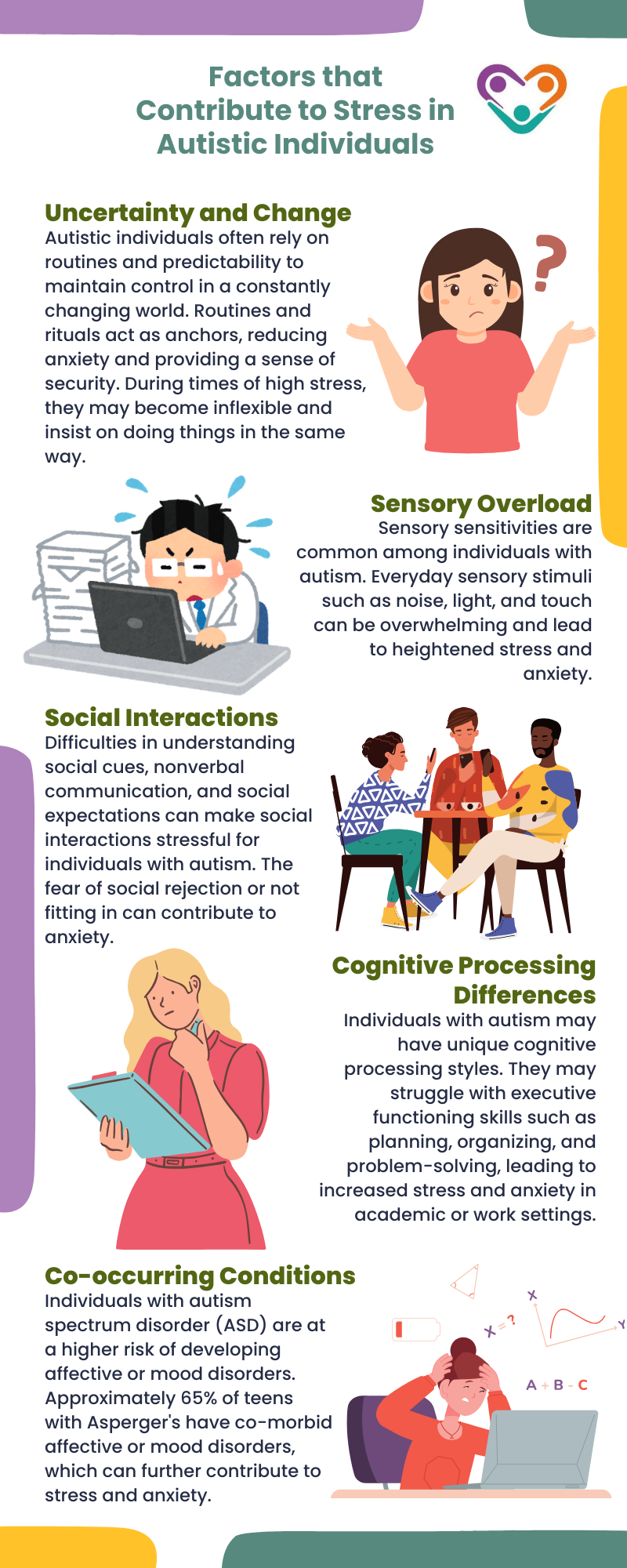Autism affects how individuals communicate, interact, and perceive the world. For those on the autism spectrum, everyday experiences can often be overwhelming, leading to heightened stress.
Understanding the relationship between autism and stress is crucial for creating supportive environments.
In this article, we’re going to explore how stress manifests in individuals with autism, the unique triggers they face, and strategies to manage and reduce stress.

The Connection Between Autism and Stress
Understanding the relationship between autism and stress is crucial for providing effective support and managing the challenges faced by individuals on the autism spectrum.
Autistic individuals often experience higher levels of stress and anxiety due to the unique way they perceive and interact with the world.
Uncertainty and unpredictability are key factors in the stress and anxiety levels of autistic individuals. They often describe the world as unpredictable, chaotic, and sometimes frightening. The difficulties in understanding and interpreting social cues, sensory sensitivities, and the challenges of communication can contribute to increased stress levels.
Autistic individuals living with very high levels of anxiety can experience rapidly rising stress levels. This leads to difficulties in managing their emotions and a higher likelihood of meltdowns. In some cases, they can even exhibit responses in the form of oppositional defiant disorder.
The overwhelming nature of these experiences can make it challenging for individuals with autism to cope with everyday situations that may seem routine to neurotypical individuals.
There are several factors that contribute to stress and anxiety in individuals with autism. These are as follows:

Understanding these factors and their impact on individuals with autism is essential for developing effective strategies to support them in managing stress and anxiety.
By creating a supportive environment, respecting individual differences, and providing appropriate tools and coping mechanisms, we can help alleviate the stress and anxiety experienced by individuals on the autism spectrum.
Stress and ASD Symptoms
Stress can play a significant role in the overall well-being and behavior of autistic individuals. Understanding the relationship between stress and ASD symptoms is crucial in providing appropriate support and interventions.
In this section, we will explore the impact of sensory and intellectual disabilities on stress in autism, as well as the correlation between cortisol levels and stereotyped behaviors.

Sensory and Intellectual Disabilities
Persons with combined sensory and intellectual disabilities, especially those with autism, are more sensitive to stress and may experience higher stress levels than people without disabilities.
The challenges faced by individuals with ASD, such as difficulties in processing sensory information and communication, can contribute to increased stress and anxiety.
Sensory overload or specific triggers can create overwhelming situations, leading to heightened stress levels and potential behavioral changes.
Cortisol Levels and Stereotyped Behaviors
Cortisol, often referred to as the stress hormone, is a key indicator of the body’s stress response. Research has shown a positive correlation between cortisol levels and the presence of stereotyped and repetitive behaviors in individuals with combined sensory and intellectual disabilities, including those with ASD.
Stereotyped behaviors, such as repetitive movements or obsessive interests, can serve as self-soothing mechanisms for individuals with autism.
In a study investigating the relationship between stress and ASD symptoms in this population, cortisol concentrations were found to be associated with stereotyped behaviors. The presence of higher cortisol levels was linked to an increase in these repetitive behaviors.
This suggests that stress may contribute to the manifestation or exacerbation of stereotyped behaviors in individuals with combined sensory and intellectual disabilities.
Assessing ASD Symptoms in Stressful Situations
Assessing ASD symptoms in individuals with combined sensory and intellectual disabilities can be challenging, particularly in stressful situations.
The Observation of Autism in people with Sensory and Intellectual Disabilities (OASID) assessment is a tool commonly used to evaluate ASD symptoms. Interestingly, cortisol responses to the administration of the OASID assessment did not differ significantly between individuals with and without ASD.
Moreover, the OASID assessment itself did not significantly increase cortisol levels, indicating that it may be a non-stressful measurement tool for assessing ASD symptoms in this population.
However, stereotyped and repetitive behaviors were found to be positively correlated with cortisol concentrations on the day of the OASID test.
This suggests a possible relationship between stress and these behaviors in individuals with combined sensory and intellectual disabilities.
Understanding the impact of stress on individuals with autism is crucial for providing appropriate support and interventions. By recognizing the relationship between stress and ASD symptoms, caregivers, educators, and healthcare professionals can work towards creating environments and strategies that minimize stressors and promote well-being for individuals with autism.
Research continues to shed light on the neurological basis of sensory issues in autism, offering hope for more targeted and effective therapies in the future. By recognizing and addressing sensory processing difficulties, we can improve the quality of life for individuals with autism and their families. If you’re seeking specialized ABA therapy in New Jersey, Indiana, Georgia, and New York, Golden Care offers comprehensive services tailored to meet the unique needs of each individual. Contact us to learn more or book a consultation today.
Sources:
https://www.autismcentral.org.uk/guidance/stress-and-anxiety
https://www.autism.org.uk/advice-and-guidance/professional-practice/autistic-burnout
https://www.autism360.com/managing-stress-with-autism-spectrum-condition
https://www.frontiersin.org/articles/10.3389/feduc.2020.540387/full
https://www.thetransmitter.org/spectrum/autistic-burnout-explained

